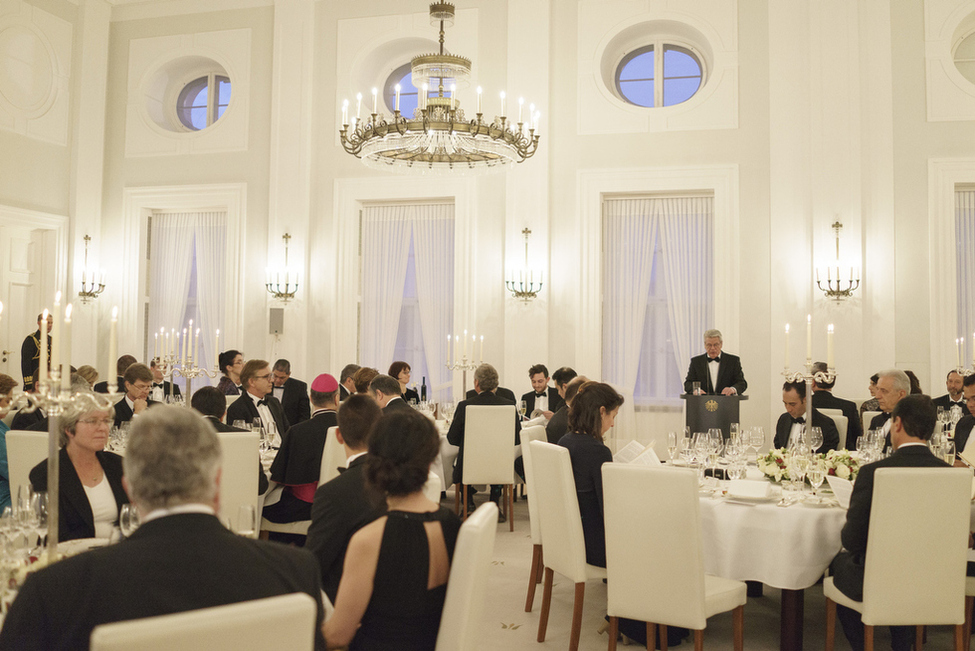Everything is interrelated.
It was as he travelled around Mexico in August 1803 that the explorer and committed humanist Alexander von Humboldt wrote those words in his diary. The way Humboldt saw Mexico has played a key part in the intense friendship that has long linked our two countries. And in this globalised world, Humboldt’s insight is more current than ever: if we want to understand and shape the world, we need to think in terms of interconnections and act accordingly. To do that, we need relationships that span continents – like the friendship between Mexico and Germany.
This morning, we spoke, among many other topics, about migration issues. We then enjoyed a tour of the outstanding Maya exhibition in the Martin-Gropius-Bau in the afternoon. And now, ladies and gentlemen, I am very glad to welcome you all to Schloss Bellevue.
Mr President, your country is one of our most important partners in Latin America. We cooperate in a spirit of trust both bilaterally and multilaterally. Together, we are striving to find answers to the pressing questions that will affect our future. They include the question of how to tackle climate change. With its progressive climate policy, Mexico is playing a leading role both in its region and among the world’s emerging economies. At the heart of every country’s climate policy is energy policy. I therefore welcome the plans to intensify Mexican-German cooperation in the fields of renewable energy and energy efficiency as well as protection of natural resources.
We are also working together to further expand our economic relations. We have decades of successful collaboration to build on. Mexico exports more to Germany than to any other European country. And for a growing number of German companies, Mr President, your country has for several years been one of the most attractive places in which to manufacture and invest in Latin America.
All of this is a delightful vindication of Mexico’s efforts to foster growth and prosperity by adopting a more internationalist stance. The OECD has also commended Mexico for its exemplary willingness to reform. Structural alterations to the economy are beginning to bear fruit.
But that’s far from all you have taken on. For example, Mexico and the people of your country suffer at the hands of unscrupulous criminal gangs. And citizens are looking to their state not only to prevent crime but also to ensure that criminal acts are investigated and punished swiftly and with due regard for the principles that underpin the rule of law. I am aware that Mexico is facing a difficult task in this respect. Germany is offering its assistance here too. There is an initial project to support Mexico’s public prosecution service, and further projects with German input could follow, if Mexico so wishes. After all, friendship is built on shared values. And protecting the right to life, liberty and security is at the very heart of our shared values.
The sciences and the arts also have a defining role in our friendship. I am not just talking about the defining influence of scientists like Alexander von Humboldt or cultural highlights like the Maya exhibition. It’s the day-to-day things that really express our relationship – as we see, for example, at the schools in Mexico where kids can study for their German Language Certificate. Interest in learning German is growing among Mexicans more generally, as we know. Many German tourists are also drawn to Mexico, and Mexican music, tacos and tequila have become a fixture of German city life. And let’s not forget that millions of Mexicans and Germans share a love of football.
Even more shared enthusiasm, even more reciprocal interest and even more mutual curiosity – that’s what I would wish for the relationship between our two countries. The Year of Mexico in Germany that we launched today, Mr President, will provide a vast range of opportunities to generate exactly that, as will the Year of Germany which will take place in Mexico from June onwards. And the people who permit those projects and presentations to fascinate, inspire or surprise them will in turn enrich the friendship between our two countries.
It is on that note, ladies and gentlemen, that I would like to raise my glass for a toast: to the health of President Enrique Peña Nieto and his wife, to the peaceful and happy future of the Mexican people and to the friendship between Mexico and Germany.


